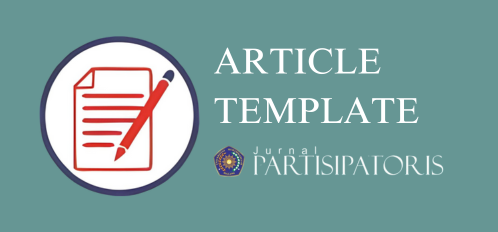PUBLIC SERVICE COMMUNICATION IN THE INDONESIAN BORDER AREAS
DOI:
https://doi.org/10.22219/jp.v5i1.27933Abstract
This study aimed at examining the patterns and strategies of public service communication in Indonesian border areas, especially those carried out by the BNPP-RI as the management agency of the state border areas. The study focuses on the public service communication of BNPP-RI in their Twitter social media account @bnpp_ri. This study employed a descriptive-qualitative approach by utilizing the Nvivo12 analysis tools as the data processing tool. Several aspects investigated to find out the communication patterns of BNPP's public services on Twitter were communication types, communication intensity, actor relations, dominant topics, and other related aspects. The study results found that BNPP, in its Twitter account, has been quite capable of utilizing digital platforms as an alternative to public service communication in the Indonesian border areas. On the other hand, some shortcomings were also indicated. For example, When viewed from content intensity, Twitter account @bnpp_ri was deemed volatile. Furthermore, @bnpp_ri is also considered unable to dominantly involve other actors/accounts in establishing the public service communication on Twitter. BNPP must address these shortcomings to optimize the communication pattern of public services on Twitter. It is also vital to consider the fundamental role of BNPP as an active agency in communicating its public services in the border areas of the Republic of Indonesia.
Downloads
References
REFERENCES
Amanda, R. (2021). PEMANFAATAN JEJARING SOSIAL TWITTER SEBAGAI MEDIA PENYEBARAN INFORMASI PUBLIK ( Studi Pada Akun Twitter @ djplkemenhub151 ). Widya Komunika, 11(2), 13–29.
Asmara, S., & Butsi, F. I. (2020). Twitter dan Public Sphere: Studi Fenomenologi Tentang Twitter Sebagai Media Alternatif Komunkasi Politik. Jurnal Ilmiah Ilmu Komunikasi Communique, 2(2), 75–84. http://ejurnal.stikpmedan.ac.id/index.php/JIKQ/article/download/30/29
Aziz, F. N., Mubin, F., Hidayat, R. J. P., Nurjaman, A., Romadhan, A. A., Sulistyaningsih, T., & Hijri, Y. S. (2021). Bagaimana Teknologi Informasi dan Komunikasi Bertransformasi Menjadi Inovasi Pelayanan Publik? Perspektif, 10(2), 616–626. https://doi.org/10.31289/perspektif.v10i2.4905
Baskara, T., & Fajar Rizki, M. (2019). Proses Publikasi Humas Badan Nasional Pengelola Perbatasan Pada Akun Media Sosial Instagram. CoverAge: Journal of Strategic Communication, 10(1), 19–26. https://doi.org/10.35814/coverage.v10i1.1229
BRIA, M. E., & SUHARNO, S. (2018). Pendekatan Kesejahteraan Sebagai Strategi Penguatan Nasionalisme Masyarakat Di Kawasan Perbatasan. Jurnal Ilmiah Pendidikan Pancasila Dan Kewarganegaraan, 3(1), 81–88. https://doi.org/10.17977/um019v3i12018p081
Chrestella Julitawati Hutauruk. (2019). BANGUNAN INFRASTRUKTUR SEBAGAI TOLAK UKUR PEMENUHAN HAK KONSTITUSIONAL DI WILAYAH PERBATASAN. Prosiding Seminar Nasional Ke-3 Fakultas Hukum Universitas Borneo Tarakan, 2655–5913(September), 1–23.
Farida, A. R. (2020). PUBLIC RELATIONS DI ERA DIGITAL. In Syiah Kuala University Press (Vol. 9).
Irdayanti, I. (2017). Membangun Ketahanan Informasi Di Daerah-Daerah Perbatasan Indonesia. TOLERANSI: Media Ilmiah Komunikasi Umat Beragama, 9(2), 135. https://doi.org/10.24014/trs.v9i2.4328
Kennedy, P. S. J., L.Tobing, S. J., L.Toruan, R., & Tampubolon, E. (2019). Diskusi Mengenai Isu Strategis Tentang Kelembagaan Pengelolaan Perbatasan Negara Dengan Pemerintah Provinsi Maluku. JURNAL Comunità Servizio : Jurnal Terkait Kegiatan Pengabdian Kepada Masyarakat, Terkhusus Bidang Teknologi, Kewirausahaan Dan Sosial Kemasyarakatan, 1(2), 120–133. https://doi.org/10.33541/cs.v1i2.1277
Makahingide, R. (2021). Upaya Pemerintah Indonesia Dalam Menangani Persoalan Di Wilayah Perbatasan Antara Pulau Marore Dan Philipina Selatan. Jurnal Politico, 10(2), 19–37.
Makarius Erwin Bria. (2020). PENGUATAN SEMANGAT NASIONALISME DI DAERAH PERBATASAN MELALUI PENDIDIKAN KEWARGANEGARAAN BERBASIS KEARIFAN LOKAL. Journal Fascho in Education Conference-Proceedings, 1(1), 763–773.
Mangku, D. G. S. (2019). Peran Badan Nasional Pengelolaan Perbatasan (BNPP) Dalam Menjaga Kedaulatan Wilayah Negara Kesatuan Republik Indonesia. Jurnal Ilmiah Ilmu Sosial, 4(2), 167–174. https://doi.org/10.23887/jiis.v4i2.16532
Muzwardi, A., Muhammad, A. S., Awangga, R. M., & Rizaldi, A. (2020). Analisis Jejaring Sosial Untuk Manajemen Pengelolaan Perbatasan Antara Negara. Jurnal Agregasi : Aksi Reformasi Government Dalam Demokrasi, 8(2), 168–187. https://doi.org/10.34010/agregasi.v8i2.3231
Puteri, D. N. (2021). PERAN BADAN NASIONAL PENGELOLA PERBATASAN DI DALAM MELAKUKAN PENGAWASAN TERHADAP PERBATASAN INDONESIA (The Role Of The National Border Management Authority Republic Of Indonesia In Supervising Indonesia’s Borders). JISIP (Jurnal Ilmu Sosial Dan Pendidikan), 5(1). https://doi.org/10.36312/jisip.v5i1.1749
Putu Wahyu Widiartana. (2021). KEDUDUKAN DAN KEWENANGAN: BADAN NASIONAL PENGELOLA PERBATASAN DI INDONESIA. Jurnal Hukum & Pembangunan, 51(1), 124–145.
Situmorang, D. M., & Ayustia, R. (2019). Model Pembangunan Daerah 3T: Studi Kasus Daerah Perbatasan Kabupaten Bengkayang. Mbia, 18(1), 49–64. https://doi.org/10.33557/mbia.v18i1.321
Taufik, T., & Warsono, H. (2020). Birokrasi baru untuk new normal: tinjauan model perubahan birokrasi dalam pelayanan publik di era Covid-19. Dialogue: Jurnal Ilmu Administrasi …, 2(1), 1–18. https://ejournal2.undip.ac.id/index.php/dialogue/article/view/8182
Downloads
Published
How to Cite
Issue
Section
License

This work is licensed under a Creative Commons Attribution-ShareAlike 4.0 International License.
Authors who publish with Jurnal Partisipatoris agree to the following terms:
- For all articles published in the Jurnal partisipatoris, copyright is retained by the authors. Authors give permission to the publisher to announce the work with conditions. When the manuscript is accepted for publication, the authors agree to the automatic transfer of non-exclusive publishing rights to the publisher.
- Authors retain copyright and grant the journal right of first publication with the work simultaneously licensed under a Creative Commons Attribution-ShareAlike 4.0 International License that allows others to share the work with an acknowledgment of the work's authorship and initial publication in this journal.
- Authors are able to enter into separate, additional contractual arrangements for the non-exclusive distribution of the journal's published version of the work (e.g., post it to an institutional repository or publish it in a book), with an acknowledgment of its initial publication in this journal.
- Authors are permitted and encouraged to post their work online (e.g., in institutional repositories or on their website) prior to and during the submission process, as it can lead to productive exchanges, as well as earlier and greater citation of published work (See The Effect of Open Access).











